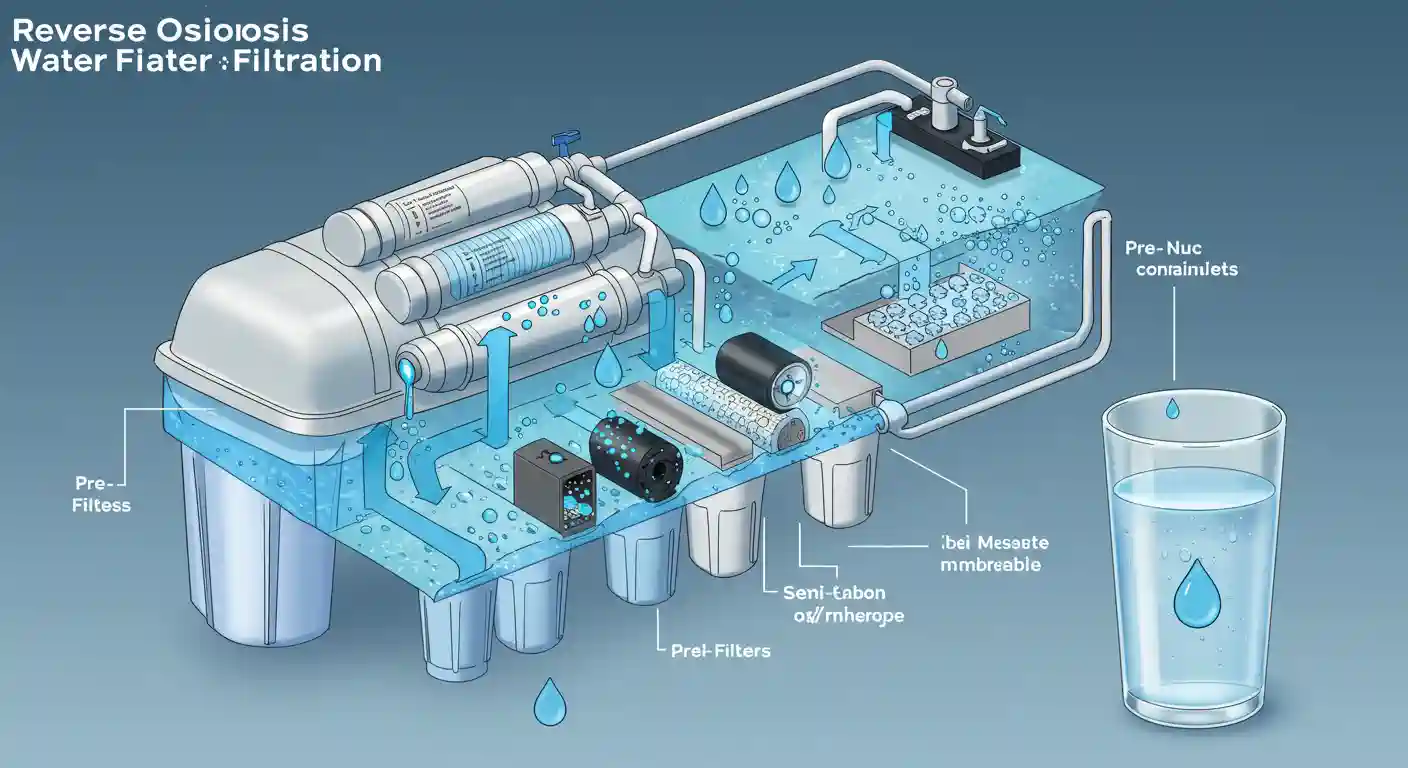Reverse Osmosis Installation in Rocklin, CA
Serving Ventura & Sacramento Counties

Professional Reverse Osmosis Installation in Rocklin, CA
Experience the ultimate standard in water purity with a professionally installed Reverse Osmosis (RO) system in your Rocklin home. An RO system provides a final barrier between your family and the contaminants that can be present in tap water, delivering exceptionally clean, great-tasting water directly from a dedicated faucet. Move beyond standard filters and embrace a comprehensive purification solution that enhances your health, improves the taste of your food and beverages, and provides total peace of mind.
Why Rocklin Homeowners Invest in Reverse Osmosis
While municipal water in Rocklin is treated to meet federal safety standards, many residents seek a higher level of purity. Concerns about the taste and odor of chlorine used for disinfection, the presence of hard water minerals, and the potential for trace contaminants like lead, nitrates, or pesticides lead homeowners to seek a more robust solution. A Reverse Osmosis system is not just a filter; it is a multi-stage purification process designed to produce water of exceptional quality, addressing these common concerns and more.
The benefits extend throughout your home:
- Superior Drinking Water: Enjoy water that is crisp, clean, and free from unpleasant tastes and odors.
- Enhanced Cooking and Beverages: Coffee, tea, soups, and even pasta taste better when made with purified water that doesn’t alter their natural flavors.
- Comprehensive Contaminant Removal: RO systems are highly effective at reducing a wide spectrum of impurities including heavy metals (lead, arsenic), dissolved solids, chlorine, fluoride, nitrates, sulfates, pesticides, and bacteria.
- Protection for Small Appliances: Using RO water in coffee makers, ice machines, and humidifiers prevents the buildup of mineral scale, extending their lifespan and improving performance.
- Environmental and Financial Savings: Significantly reduce your reliance on single-use plastic water bottles, saving money and lessening your environmental impact.

How Reverse Osmosis Delivers Unmatched Purity
The effectiveness of a Reverse Osmosis system lies in its sophisticated, multi-stage filtration process. Water from your tap is forced through a series of advanced filters, each targeting specific types of impurities.
- Sediment Pre-Filter: The first stage captures larger particles like dirt, rust, sand, and silt. This protects the more delicate filters that follow from clogging and damage.
- Carbon Pre-Filter: Next, the water passes through an activated carbon filter. This stage is crucial for adsorbing chlorine, chloramines, and other chemicals that cause unpleasant tastes and odors. It also removes volatile organic compounds (VOCs).
- Reverse Osmosis Membrane: This is the core of the system. Water is pressurized and forced through a semi-permeable membrane with microscopic pores. These pores are so small that they allow water molecules to pass through but block a vast majority of dissolved solids and contaminants, which are then flushed away in a brine solution.
- Carbon Post-Filter: As a final polishing step, the purified water passes through one last carbon filter to remove any residual tastes or odors before it reaches your glass, ensuring the highest quality finished product.
Our Expert Installation Process: Seamless and Secure
While DIY kits are available, professional installation is essential for ensuring your RO system operates at peak efficiency and without risk of leaks or damage. Improper installation can lead to low water pressure, inefficient filtration, and costly plumbing repairs.
Our process is designed for your complete confidence. A trained technician will assess your under-sink plumbing, countertop material, and water pressure to determine the optimal placement and configuration. We handle every detail, from precisely drilling the faucet hole to making secure connections to your cold water line and drain pipe. After installation, we thoroughly test the entire system, check for leaks, and demonstrate its operation and maintenance schedule to you, ensuring you are fully comfortable with your new purification system. We provide both point-of-use (under-sink) systems for dedicated kitchen use and whole-house RO solutions for comprehensive purity at every tap.
System Maintenance for Lasting Performance
To maintain its high level of performance, your RO system requires periodic maintenance, primarily consisting of filter and membrane replacement. The pre- and post-filters typically need to be replaced every 6 to 12 months, while the RO membrane can last for 2 to 4 years, depending on your water quality and usage. Adhering to this schedule is critical for preventing contaminant breakthrough and ensuring the system’s longevity. We provide clear guidance on the proper maintenance schedule for your specific model.
Answering Your Questions About Reverse Osmosis
Is RO water safe? What about beneficial minerals?
Yes, RO water is perfectly safe and is considered one of the purest forms of drinking water available. The RO process is so fine that it removes nearly everything, including minerals like calcium and magnesium. It's important to remember that the vast majority of essential minerals are obtained from a balanced diet, not from water. For homeowners who prefer mineral content in their water, remineralization post-filters can be added to the system to reintroduce a healthy balance of beneficial minerals after the purification process.
How much water does an RO system waste?
RO systems use a process of cross-flow filtration, which requires additional water to clean the membrane and flush away rejected contaminants. While older systems had a high ratio of wastewater to pure water, modern, high-efficiency models have dramatically improved. Today's systems are designed to minimize water waste while maximizing purification performance, making them a much more sustainable choice.
What factors influence the cost of installation?
The total investment for a reverse osmosis system depends on several factors. These include the type of system (point-of-use vs. whole-house), the quality and number of filtration stages, the brand, and any additional features like a remineralization cartridge or a designer faucet. The complexity of the installation, such as the type of countertop material that needs to be drilled, can also play a role.


